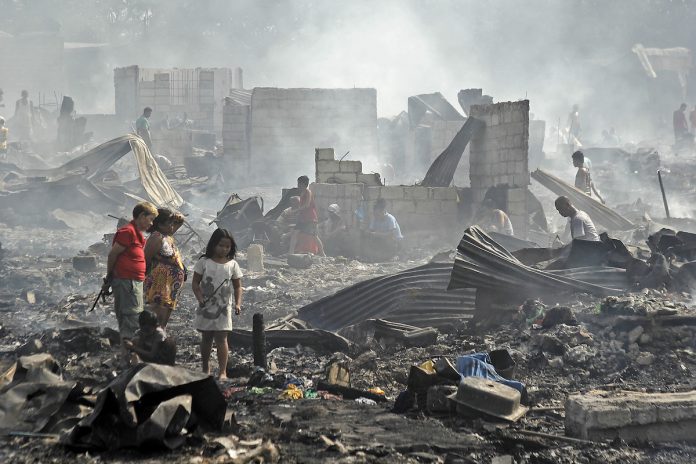Reflection for the 3rd Sunday of Advent (Cycle C)
How must we prepare for the coming of the Lord of the kingdom of justice and peace? We prepare by becoming the embodiment of its spirit.
The author of Luke narrates to us the words of John, “Whoever has two cloaks should share with the person who has none. And whoever has food should do likewise.”
We are exhorted to give unconditionally from our excess, for there are so many others – whom we dare call “brothers” or “sisters” – who are surviving on much less than what they need in order to live. “Stop collecting more than what is prescribed.”
We ought not to claim to deserve what clearly is needed by others – even if they are “undeserving” – in order to be sustained. “Do not practice extortion, do not falsely accuse anyone, and be satisfied with your wages.” We must not deceive nor threaten especially when we are in a position of influence or power, simply to obtain what we want.
Thus, the praxis of justice and peace seems to be based on a supernatural charity manifested in the interiorly-directed social action of evangelical simple living or Gospel poverty. It stems from a realization that we actually don’t need so much goods in order to live in tranquil happiness; and if we all can only be content with whatever the Spirit provides, there always will be something we can share for those in need. The providence of God channeled through nature will indeed be bountiful enough and sufficient for all.
Real poverty is the consequence primarily of our human instinct towards a self-contained, self-sustained self-centeredness, and of the social structures we create and maintain to support it. This understanding of poverty that interrelates one’s pursuit of self-interests at the expense and hence, to the detriment of another, is oftentimes disputed, with the overly confident assertion that “everybody can become rich as long as one yearns to be rich, and that only the others should be blamed for their poverty.” Up to a certain extent, the pursuit of one’s interests for self-preservation is morally acceptable, but when one’s pursuit already becomes a hindrance to another’s right to their own growth and development, that intention or action becomes morally questionable.
Unfortunately, that “extent” is often blurred and vague, and hard to define as the same for everyone: How does one define what “one needs” and “the other needs?” How does one know when what “one wants” is already hindering what “the other needs?” What “one needs” is often interpreted as what “one deserves” to rationalize what “one wants;” or what “the other needs” is often interpreted as what “the other deserves” to rationalize “not sharing” when “the other is undeserving.” How we define “extent” is often left to our individual discretion: how much should we keep for ourselves, and when and how much should we forego and share for others.
Yet, it is imperative for the sake of social harmony to strive for a social equality in which those who have more than what they need, must be exhorted to give from that excess to those who have less, so that all will have what they need. Evangelical simple living clarifies “extent” because it is a voluntary reducing of what “one needs” in order to increase “how much can be given for others.” Its theological basis is often Christological simplicity and kenosis: We are simple because Christ was simple, and we give because Christ gave it all.
Gospel poverty in fact, frees us from the burden of an anxiety towards pleasure and possessions that are fleeting and impermanent. It frees us for the more meaningful burden of caring for what is more important and eternal: our relationship with God and with ourselves as well as with others.
It inculcates in us a healthier attitude towards the gifts of divine providence: When we come to the ultimate realization that we actually “do not own anything,” we are liberated from the worries of “having more” or “wanting to have more.” Thinking of ourselves then as stewards rather than “owners,” we use earthly goods with a certain detachment that keeps us from hoarding them for security, and in an ordinate moderation that allows us to share them generously with others and not to wield them as tools for oppression. Evangelical simple living is not to deny the gifts rather to humbly accept them in sincere gratitude. In this way of life, we believe that the only true treasure is faith, that one’s inadequacies will always be filled by the goodness of the Other.
May I invite you to pray this doxology with me: “My strength and my courage is you, my Lord! “I cry out with joy and gladness, for I “have no further misfortune to fear.” “The Lord, my God, is in my midst” and I will “draw water from this fountain of salvation.” You will renew me in your love, giving us the peace “that surpasses all understanding.” Forever, I will give thanks to you, “acclaiming your name, making known your deeds among the nations!”
Brother Jess Matias is a professed brother of the Secular Franciscan Order. He serves as minister of the St. Pio of Pietrelcina Fraternity at St. Francis of Assisi Parish in Mandaluyong City, coordinator of the Padre Pio Prayer Groups of the Capuchins in the Philippines and prison counselor and catechist for the Bureau of Jail Management and Penology.
The views expressed in this article are the opinions of the author and do not necessarily reflect the editorial stance of LiCAS.news.









